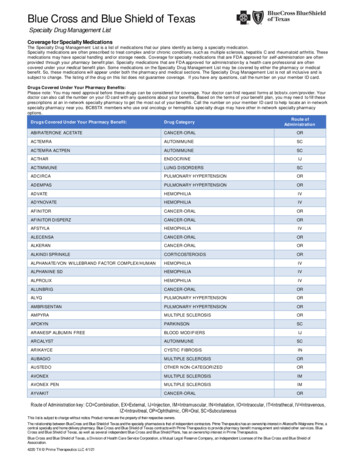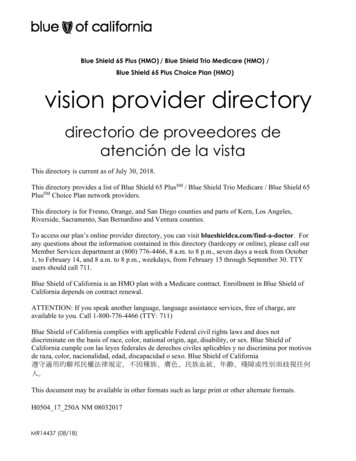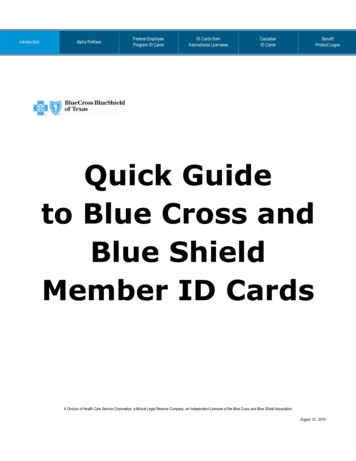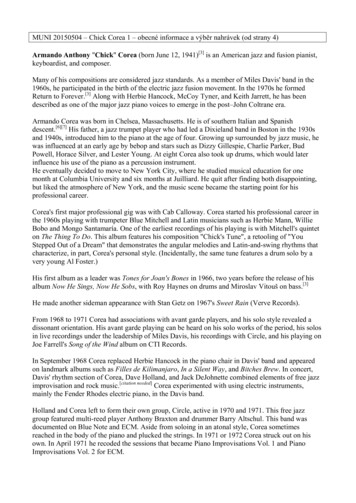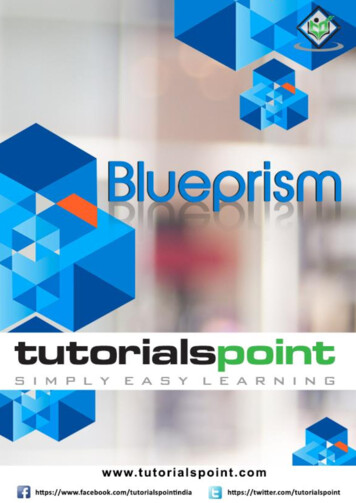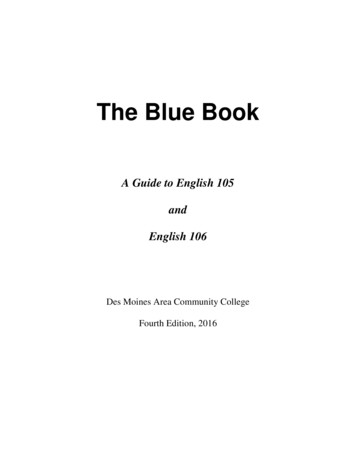
Transcription
The Blue BookA Guide to English 105andEnglish 106Des Moines Area Community CollegeFourth Edition, 2016
Table of Contents-,--What to Expect in English 105 and English 1062What is my role as a college student?What can I expect from my composition instructor?How should I contact my instructor?What should me instructor expect of me?Will my papers be graded objectively?34479Overview of English 105 and English 10610Grading PapersDetermining Course GradesQuestioning Course Grades101111Overview of English 105/Composition I12ENG 105 ScopeCourse CompetenciesENG 105 AssignmentsENG 105 Sample Grading Rubric12121417Overview of English 106/Composition II18ENG 106 ScopeCourse CompetenciesENG 106 AssignmentsENG 106 Sample Grading Rubric18182023Common Composition Errors241.2.3.4.5.6.7.8.2527283031323335Language ProblemsErrors in Sentence GrammarErrors in Sentence RhetoricPronoun ProblemsVerb ProblemsSpelling ProblemsPunctuation ProblemsParagraph ProblemsHelpful Websites40Works Cited41Common Error Index(inside back cover) 42
Acknowledgements and Comment SolicitationI would like to especially thank Krystal Hering for adding graphics and improvingthe overall appearance of this version of The Blue Book.I would also like to thank the following individuals without whose contributions,support, and inspiration this work in progress would have never seen the light ofday: Brian Green, Judy Hauser, Alan Hutchinson, Jan LaVille, Sam Miller, KayMueller, Eden Pearson, Sam Pritchard, Dale Ross, Jim Stick, Iowa StateUniversity Guidebook editors (1987—89), DMACC Boone Campus SupportStaff, and DMACC Copy Center Staff.Finally, because composition course expectations are constantly changing, Iwould also like to hear from you. Feel free to contact me to help improve futureeditions of this reference.Good luck this semester!Bret Ross (Editor, The Blue Book)DMACC, Boone Campus1125 Hancock DriveBoone, IA 50036515-433-5093baross@dmacc.edu
What to Expectin English 105 and English 106Welcome to the composition program at Des Moines Area Community College! AsEnglish faculty, we hope that our time together will be interesting, challenging (in all thebest ways) and worthwhile. We also hope that by reading The Blue Book, you will learnmore about what takes place in DMACC composition classes, such as information aboutteacher expectations, sample assignments, and grading standards, and that you willdiscover guidelines for becoming a more successful composition student. As you read,make notes about any questions you have, so that you can ask your instructor later, beforean assignment is due.English 105 (Composition I) and English 106 (Composition II) are courses designed toimprove your communication skills so that you can be more successful in other classesand on the job. Although the work will be focused on improving your writing skills,other related areas— listening actively, reading critically, analyzing and evaluatingresearch, and using language effectively—will also be emphasized in these courses.The Blue Book is divided into five sections: What to Expect in English 105 and English 106Overview of English 105Overview of English 106Common Composition ErrorsHelpful WebsitesIn addition to helping you get off to a good start in your composition class, The BlueBook will also be useful as a reference: The fourth segment, Common CompositionErrors (see pages 23-37), will help you identify some writing problems throughout thecourse so that you can discuss them more easily with your instructors, tutors, and fellowstudents.The Blue Book, however, should not be seen as a substitute for your instructor’s syllabusor for DMACC’s Student Manual. Individual course expectations, procedures, policies,and course schedule (including due dates) found in your instructor’s syllabus should befollowed closely. This guide merely describes those expectations and experiencescommon to most composition courses. The questions which follow anticipate somecommon concerns students have about composition courses at the college level.2
What is my role as a college student?Your DMACC composition course is designed to help you expand your knowledge baseand skills. In short, you are here to learn something. Throughout this process, you willcontinue to improve yourself: You will be striving to become a better citizen, parent,employee, or whatever role you play in the greater society. But that’s not all. As acollege student, you enjoy the privilege of having experts teach you how to teachyourself. Once you achieve this ability, you establish credibility as an educatedindividual. You become more curious about the world around you, and, often, the worldbecomes more curious about you.Unfortunately, some students enter composition courses with unrealistic expectationsabout their roles as students. Their thinking often resembles something like this:Instructor(producer)!Information(product)I. Student(consumer)In the model above, the student consumes information in the same way he or shepurchases a new pair of shoes. But education works best when students see themselvesas producers as indicated by the model Instructor(quality control)In this model, the student shares equal responsibility for his or her education. In collegecomposition courses, the instructor cannot produce your writing —you do! Yourinstructor only serves as your guide throughout the process. Then, during the course andat the end of the term, it’s the instructor’s responsibility to express how well you did inthe form of a grade. If you follow assignments with care, produce quality material, meetdeadlines and adhere to other course policies, you should receive a respectable grade.But education is about more than accumulating good grades; it’s about improving societyas a whole.Ultimately, when students realize their potential as producers rather than as passiveconsumers, the whole society benefits. No business or organization wants a nonproductive individual on staff. Who would hire a song writer who does not write songs?3
On the other hand, those students who have gained the confidence and skills to producequality work during rapidly changing circumstances will likely make any organization orbusiness more successful. The more successful organizations and businesses become, themore successful society becomes.So as you work through your composition courses, remember the goal is for you toproduce papers that you can point to with pride as quality work. By accepting the role—and responsibilities—of being a producer in the educational process, you will have gonea long way toward making college a more rewarding experience.What can I expect from my composition instructor?Key to your success in English 105 and 106 (and all college classes, for that matter) isinteracting in a positive way with your instructor. Begin this process by finding out yourinstructor’s expectations. A good place to start is by reading the course syllabus withcare. Below are typical features of a composition course syllabus: behavioral expectationsgrading policiesattendance expectationsdisability statementcontact informationtextbook informationcourse scheduleoffice hoursIf you have trouble understanding any of the instructor’s policies (e.g., you don’tunderstand how the instructor grades papers), please consult with your instructoroutside of class, early in the term. In most cases, you will be able to resolve anypotential misunderstanding during this meeting, and you will develop a greater rapportwith your instructor as well.How should I contact my instructor?Students and instructors typically communicate outside of class through one of threechannels: face-to-face communications between the student and instructor email communications telephone communicationsFace-to-Face CommunicationsIf you need to communicate with your instructor for any length of time beyond a minuteor two, please do not email or phone your concerns to your instructor. Instead, visit yourinstructor during office hours or arrange to talk with your instructor before or after class.Depending on the nature of the concern, your instructor may set up additional4
conferences with you to discuss the issue. The tips below will help you achieve asuccessful conference: If your conference has been scheduled, arrive on time with a positive attitude. Agood start to any conference would be to thank your instructor for taking time tohelp you with your class work. Express your concerns patiently and clearly, allowing your instructor to respondwithout interruptions. Although you may become frustrated, focus oncooperating with your instructor to solve the problem. She or he may be asfrustrated as you are, but you share the desire for a positive outcome. Worktogether and stay encouraged. When the conference ends, thank your instructor for his or her advice and time.Then take time to reflect on the meeting. You may want to document what wasdiscussed. This will help you remember the important points so that futureproblems may be avoided.Email CommunicationsEmail messages have become a popular method of communication betweenstudents and instructors. Sometimes, though, a more thoughtful and carefullyworded message would make the message content more effective. The advicebelow should help make your emails more successful: Check course documents to see if you already have the information beforesending a message. In traditional face-to-face classes, emailing works bestwhen you seek an answer to a simple question not apparent in your syllabus,assignment sheet, or class notes. Before emailing your query to yourinstructor, then, please refer to these documents to see if you can answer thequestion yourself. Doing so will save time for all involved. Allow adequate time for a response. Although most instructors are diligentabout checking their email, their priorities may differ from your priorities.Also, remember that instructors are not in their offices, nor are they in frontof their computers, 24 hours a day. If you send an email at 2 a.m. or duringweekends, you can expect some delay in the response. Compose the message with care. The quality of the message content createsan impression of you as a communicator. Most instructors will expect thesame composition standards in your emails as they do in your papers. Poorlywritten emails containing texting abbreviations, sentence fragments,misspellings, all letters in lower case or upper case, etc. may not garner aresponse, or you may be asked to revise the email. At the very least,proofread.5
Sending an email does not automatically excuse you from coursework. “Didyou get my email?” is a common question asked by many students who missclass or submit late work. When an instructor answers “Yes,” do not assumethat you are excused from your instructor’s syllabus policies and procedures.When an instructor answers “No” or “I cannot recall” do not assume it is theinstructor’s fault for not addressing your excuse for absence or late work.Instead, follow the advice below. Politely communicate a request for a response, if one is needed. Sometimesyou may not need your instructor to respond, such as when you send an emailinforming your instructor that you are going to be unavoidably late to class.Never assume, though, that your instructor will reply to each and every emailhe or she receives. If you wish the instructor to acknowledge your email, youmust indicate this to the instructor, in a polite manner, with a closing noteasking for a response:Dear Professor,I am ill and will not be able to attend our 105 class tomorrow at10:10. I will get notes from one of my classmates to cover thematerial I missed. Please let me know that you received this email.Thank you.--George Smiley, student Expect that your email message may be saved as documentation. Sometimesemail becomes a channel to vent complaints about grades, instructor attitudes,other students, etc. Remember that the same rules governing classroombehavior as outlined in the DMACC Student Manual also apply to email. Incollege—and on the job—never send an email written in frustration. Suchemails provide instructors, employers, and authorities a permanent record ofyour behavior. If you feel angry or frustrated, wait 24 hours—or more—before sending an email message, and revise the message until the tone andcontent are appropriate.Telephone CommunicationsWhenever possible, speak to your instructor face-to-face before or after class or during ascheduled office hour. If there is no other option, however, follow these guidelines whencommunicating by telephone:If your instructor answers the phone:1. Name the person you are calling if the instructor does notidentify himself or herself.2. Identify yourself and the reason for calling.3. Allow your instructor to respond when appropriate.4. Enunciate clearly.6
If you need to leave voice mail:1. Avoid rushing the voice mail.2. Enunciate clearly.3. Provide a complete message including Your name. Telephone number. Time and date of your call. Reason for the call.As with email, if you expect a response, please politely request one. Also, there may beunanticipated delays waiting for a response. Please avoid multiple phone calls to thesame instructor if you experience a delay. Your instructor will get back to you when timepermits.What should my instructor expect of me?No other course at the first-year level is likely to develop discipline more than acomposition course. Simply put: writing is work. Typically, students should expect toput more time outside of class into a college composition course than any class theyexperienced in high school or their other first-year college courses. To meet yourinstructor’s expectations for class preparedness, a good rule of thumb is to spend at leastone hour outside of class (reading/analyzing assigned material, researching, etc.) forevery hour your class meets per week. Expect also to increase your workload outsideclass time when planning/drafting/revising/editing major papers.Also, when taking a composition course try to avoid these bad habits: missing classcoming late to classplaying video games, searching Facebook, or visiting websites in acomputerized classroom instead of writingtexting during classcarrying on side conversations during classstudying for a test in another course during classsleeping during classBy eliminating bad habits and by following your instructor’s classroom expectationslisted in the course syllabus, you can make your learning experience a positive one.Generally, most instructors will respond positively to good habits listed below (UtahState; adapted in Bittner and Ranch 57-58, and re-adapted, with the publisher’spermission, here): Attend class regularly. You lose when you skip a class. If you mustmiss a class, arrange for another student to keep notes for you (don’texpect professors to give you theirs, even if you send a request viaemail).7
Arrive on time and be attentive in class. Late arrivals are a distractionto the entire class. If you must be late, find the nearest convenient seatand quickly and quietly sit down. Then listen actively by taking goodnotes. Submit assignments on time. Late assignments suggest a lack ofenthusiasm and commitment, and your instructor will likely penalizeyour grade. (Remember that late assignments on the job are rarelytolerated by most employers.) Make sure that you understand, andadhere to, the course policies regarding deadlines and penalties for latework as outlined in the course syllabus. Accept responsibility. Don’t make excuses; learn from your mistakesinstead of simply defending them. Avoid distracting your classmatesby complaining about the instructor or an assignment during classtime. Submit high quality work in both content and form. Always try to doyour best work. The process of completing an assignment may requirean extended time commitment from you, more so if research isinvolved. Learn to get started on papers early and revise them up to thedue date. Avoid trying to generate papers the night before they’re due. Ask questions relevant to the course material. By asking relevantquestions, you show your instructor that you are engaged in the course.On the other hand, if you ask questions like, “Can I leave early?” or“Can we have class outside?” or “Are we doing anything importanttoday?” you are not likely to gain your instructor’s respect andadmiration. Visit your instructor during office hours. At least once during thesemester, drop by your instructor’s office to ask a relevant question orto inquire about your general progress in the course. Your instructorcan get to know you a little bit so you’ll become more than “a face inthe crowd.” Avoid Academic Dishonesty and Plagiarism. Plagiarism is a specificform of cheating in which a student fails to give proper credit forwritten work that belongs to someone else. It involves trying to passoff the work of others as one’s own. Extensive revision of your workby someone else can also be considered plagiarism. Students falselyassume that they will not be caught; however, instructors are veryadept at identifying work that has been incorrectly documented or“borrowed” from another source without proper citation. Yourinstructor may also choose to use a plagiarism detection service, such8
as Turnitin.com, or may use an online search tool, like Google, todouble-check passages you have submitted as your own work.For more information and rules governing Academic Dishonesty,please consult a good handbook and your DMACC Student Manual.You may also want to visit the DMACC Academic Integrity website spx.Will my papers be graded objectively?Students sometimes assume that college instructors are biased negatively towards them aspeople, and this is what causes low grades. Your grade, however, is determined by thequality of the work you produce, not simply because an instructor “likes” or “dislikes”you.Other students are troubled by the lack of a single “right answer” in composition and thussee grades as being arbitrary—as compared to a course like mathematics where gettingthe “right answer” counts. True, there are not as many “right answers” in composition asin other disciplines because there can be many ways to write a paper successfully.But getting the “right answer” does not translate into “objective” evaluation. In fact, yourperformance in college is judged subjectively by instructors: their curricular choices aresubject to both the kind of training they received in their field of study and to theirapproach to teaching college students. Some math instructors, for example, give partialcredit for wrong answers on exams and/or “curve” final grades. Moreover, subjectiveevaluations are also prevalent in the workplace—from daily assessments to the infamous“six-month evaluations” where employees are rated both by their performance and bytheir ability to work with others.Your composition instructor is trained to recognize those patterns and strategies inwriting that work best for future coursework and on the job. Your grades, then, are basedon how well you develop such patterns and strategies and apply them appropriately inyour papers and other coursework. Also remember that your instructor applies the samegrading standards to your classmates’ performance. Overall, you should be confident thatyour performance is measured accurately and fairly.9
Overviewof English 105 and English 106This segment describes approaches used by mostinstructors in both English 105 and English 106.Typical approaches common to both compositioncourses—grading papers, assigning final grades, andimplementing the DMACC course assessmentproject—will be discussed below. More informationabout each course can be found in the “105 Overview”and “106 Overview” following this segment.Grading PapersThis section describes how in general how instructors typically assign paper grades. Formore specific information or criteria about assigning grades, please refer to yourinstructor’s syllabus.EvaluationYour ability to produce quality work in composition will be observed and evaluated inmuch the same way athletic coaches observe and evaluate a student athlete’s progress byoffering advice about how to improve a specific athletic move or strategy.As your writing coach, your instructor will provide you with helpful comments aboutyour writing. For instance, your instructor may point to places where more contentdevelopment is needed, or where a better organizational pattern would strengthen thepaper’s effectiveness. Also like an athletic coach who “preaches the fundamentals,” yourinstructor will point out errors in grammar and punctuation and may refer you to the“Common Composition Error” section of The Blue Book or other handbook to promoteyour development as an effective writer.Your instructor’s comments, then, should not be interpreted as idle criticism, having noconsequence. On the contrary, the commentary is designed to motivate you to thinkabout your writing process so that revision of your papers will lead to improved style anddeeper insights in future work.RevisionRevising papers is critical to the recursive process of writing. Depending upon yourinstructor’s approach to teaching the writing process, this revision may involve one ormore of these strategies: composing multiple whole drafts leading to a final product,rethinking and rewriting major sections of a paper, following your instructor’sadvice, ormaking your own changes to papers as you draft them.10
In one way or another, then, how well you learn to revise papers will affect yourgrade. Most often, if you apply appropriate revision techniques to papers, the quality ofyour writing will improve.Grading Rubrics—How to Check Your GradeTo help you understand assigned grades, many instructors include a grading rubric intheir syllabi, or they may include one with assignments. A rubric is defined as asummary of the criteria used to make a judgment. When you do not understand why youreceived a certain grade for a particular paper, you should follow these three steps beforeconsulting with your instructor about your grade:1. Check your assignment sheet to make sure you fulfilled all of the criteria forthe paper.2. Re-read all of the instructor comments on your paper.3. Review your instructor’s grading rubric (if available).Please refer to the sample grading rubrics in the “105 Overview” (p. 16) and/or “106Overview” (p. 22) for a general idea of how an instructor might evaluate your papers andassign a grade.Determining Course GradesYour course grade in composition reflects your instructor’s assessment of your progressin the course: how well you’ve achieved the course competencies and adhered to coursepolicies. The instructor may use any evidence—attendance, class discussions, in-classcomputer exercises, quiz scores, etc.—that will help evaluate your progress, but yourability to produce quality work on major paper assignments is often the primary basis foryour course grade.Feel free to ask your instructor—politely, of course—about your grade or how grades arecalculated. Your instructor may not know you have questions unless you share them, andif you have questions, it is likely other students do as well.Questioning Course GradesIn the vast majority of cases, your course grade has been determined honestly and fairlyby your composition instructor. Because any time during the semester, you may ask yourinstructor about your standing or progress in English 105 or 106, your course gradeshould come as no surprise to you at the semester’s end. If you wish to improve yourgrade as the semester develops, please follow this advice: Attend all classes, and arrive at class on time.Make appointments with your instructor outside of class to go over roughdrafts (Hint: Try to meet during your instructor’s office hours).Make writing the issue: For example, ask your instructor where she or hethinks your writing is weak, and strive to correct those weak areas.11
At the same time, when questioning the course grade, please avoid these bad habits: Do not wait until the semester’s end to begin asking questions about yourcourse grade. Doing so makes the grade the issue, not your writing.Avoid defending the indefensible: For example, avoid arguing that paperssubmitted late should not be penalized when this policy is in the syllabus.Do not make the grade the issue: For example, do not state that you need acertain grade to get credit for a composition course at a four-year school, orthat you need a certain grade to please your parents who are paying for youreducation, etc.Overview of English 105/Composition IBecause instructors employ a variety of successful approaches to teaching English 105,this section will focus on those experiences and ideas common to Composition I. Be sureto read your instructor’s syllabus carefully to preview your course and ask questions asthey occur. The following features of English 105 are covered in this section: ENG 105 Scope Course Competencies ENG 105 Assignments ENG 105 Sample Grading RubricENG 105 ScopeEnglish 105/Composition I is your introduction to composition at the college level. Inthis course, you will learn the very important relationship between an author’s purpose ina written piece and readers’ expectations. By reading the work of professional writers,you will learn how to “read like a writer” to see how writers fulfill or challenge readerexpectations. Then you will apply what you’ve learned to your own writing.The course may begin with students writing about their own observations andexperiences. At some point in the course, students typically analyze and write about thework of other authors. Students will also be expected to include research in one or morepapers using Modern Language Association (MLA) format for documentation.Course CompetenciesA “competency” is defined as a required course component. Students sometimes usethese competencies as a checklist to chart their strengths and weaknesses in English 105.As the course develops, the terminology used in these competencies should become clearto you. If you have trouble understanding any of the terms or concepts listed below,please consult with your instructor.12
ENGLISH 105/COMPOSITION IDescriptionComposition I introduces students to the college-level writing process through the constructionand revision of a series of expository and persuasive essays. Students may also produce otherwriting appropriate to the academic and working world. Through exposure to a variety of collegelevel readings, the students will build critical reading skills, and students will be expected torespond to assigned readings in a variety of ways. The course introduces library and computerbased research strategies. Students will write and revise at least 4 essays and produce a minimumof 20 pages.Course Competencies1. Generate writing as an active process, using planning, drafting, revising, and editing1. Explore invention activities, such as brainstorming, listing, word-mapping,reading, freewriting, discussing, and journal writing2. Use planning and drafting techniques, such as outlining and freewriting3. Consider audience, purpose, and context4. Revise for clarity, coherence, and conciseness5. Use technology as appropriate given the task, assignment, and setting2. Evaluate strategies and approaches for organizing content1. Write well-structured introduction, body, and conclusion paragraphs2. Organize essays using thesis statements and topic sentences3. Use paragraphs as an organizational method4. Incorporate effective transitional devices5. Integrate relevant, credible supporting details and evidence from source materials6. Incorporate quotations from source material3. Examine college-level reading skills as an active part of the writing process1. Identify various genres of expository writing, including narrative, essay, andarticle2. Develop vocabulary, using relevant reference resources3. Examine various rhetorical and organizational methods4. Use effective reading techniques such as rereading, annotating, paraphrasing, andsummarizing5. Analyze the content, expression, and context of verbal and/or visual texts4. Synthesize research resources appropriate to the task and context1. Develop researching skills to locate credible sources, which may includeinterviews, observations, surveys, DMACC library resources, library databases, andother web resources2. Distinguish between credible and unreliable print or electronic sources3. Integrate research into writing when appropriate4. Acknowledge ownership of ideas when using source information5. Integrate standard college-level documentation practices1. Understand definitions and consequences of plagiarism1. Understand definitions and consequences of plagiarism2. Identify reasons for documentation3. Distinguish between personal ideas and outside sources13
4. Develop summarizing, paraphrasing, and quoting skills using primary andsecondary sources5. Integrate sources effectively within the given context6. Document sources in MLA or APA formatting style6. Adapt to the rules of Standard English grammar appropriate to context1. Use standard rules of grammar, punctuation, mechanics, and spelling2. Construct syntactically sound sentences using varied, appropriate vocabularyENG 105 AssignmentsYou can expect to write four to eight papers in English 105. Please refer to the end ofthis section for a few sample English 105 paper assignments.Paper assignments typically state clearly the purpose and goals of each assignment. Ifyou have trouble understanding any aspect of an assignment, please consult withyour instructor, preferably early in the writing process.The class work in English 105 may also include shorter writing exercises that helpgenerate ideas or emphasize a concept or skill central to the production of a paper. Y
English 105 (Composition I) and English 106 (Composition II) are courses designed to improve your communication skills so that you can be more successful in other classes and on the job. Although the work will be focused on improving your writing skills, other related areas—listeni

